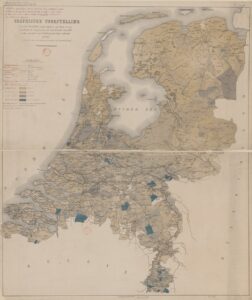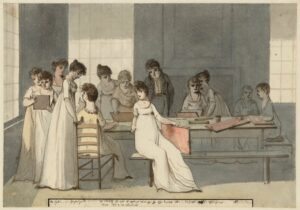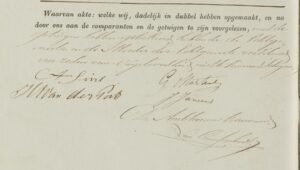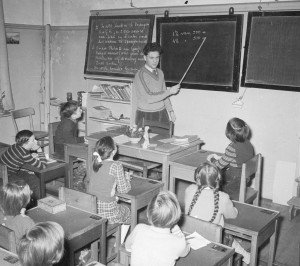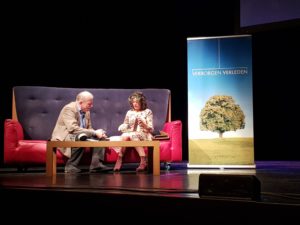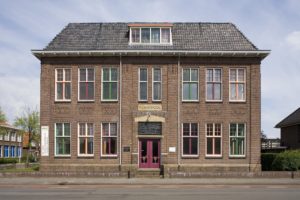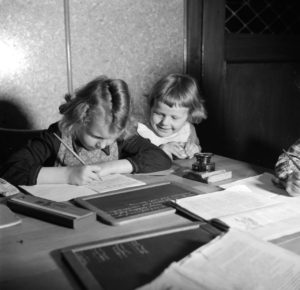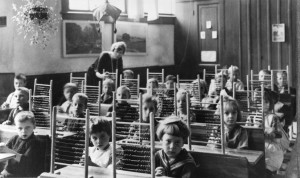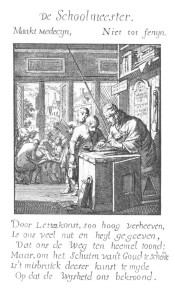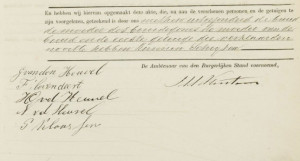This week we are looking at a thematic map from 1887. It shows the percentage of children between the ages of 6 and 12 who were not in primary school. The statistics were shown per municipality. The darkest blue color represents areas where more than 30% of children did not go to school. A zoomable version is available at Gallica. The map shows great differences between parts of the Netherlands. In general, municipalities in the north had higher school attendance than municipalities in … [Read more...]
Dutch term – Meisjesschool
A meisjesschool is a school for girls. These schools started to appear in the 1800s to teach the daughters of the upper classes. Besides reading and arithmetic, they would be taught to draw, sew, and make music. Meisjesscholen were typically available in large cities only. … [Read more...]
Dutch term – Verklarende niet te kunnen schrijven
In civil registration records, the informants of birth and death records and the bride and groom and their parents in marriage records, as well as the witnesses, are asked to sign the record. If the people were illiterate, this will be noted in the final sentences of the record. Often you will see a sentence like "verklarende de moeder van de bruidegom uit hoofde van ongeleerdheid niet te kunnen schrijven" [the mother of the groom declares not to be able to sign, as not having learned … [Read more...]
Dutch term – Onderwijzer
An onderwijzer was a teacher at a primary school. Appointments of teachers of public schools can often be found in the municipal administration or town records. Appointments of teachers of religious schools can often be found in the records of the church. … [Read more...]
Column – Virtual
At the Famillement event last June, I noticed once more how nice it is to talk genealogy in person rather than online. To meet new people, and where you can feel the presence of a good speaker in the farthest corner of the room. Like the Famillement, most genealogy educational opportunities in the Netherlands are on-site. We go to an archive for a palaeography course, or go to a meeting of a genealogical society to hear a presentation about a type of source. The topic is often selected to … [Read more...]
Dutch term – Rijkslandbouwwinterschool
The rijkslandbouwwinterschool was the national agricultural winter school. Farmer's sons (and later, daughters) attended the school during the winter months when there was not a lot to do on the farm. They'd learn about growing crops and raising cattle. This type of school was introduced in the period 1890-1920 throughout the country. Some still exist, but as a year-round school with an agricultural curriculum. … [Read more...]
How Taking Clients Made Me a Better Genealogist
I had been doing genealogy for over twenty years when I started taking paying clients. I had done pro bono work for friends, researching all over the Netherlands, but that was more in a coaching capacity and often did not require formal reporting. In the years since I started taking clients, my skills have grown. Here are five ways in which being a professional genealogist has made me a better researcher. 1: Nothing beats prose writing When you work for a client, one of the things that you … [Read more...]
Could You Have Been a Teacher in the 19th Century?
During my research into one of my relatives who was a teacher in the 19th century, I came across some math problems published in a newsletter for teachers. These questions were used during examinations of assistant teachers at elementary schools in 1878. People taking the assistant teachers' exam were usually around 18 years old, had finished their own elementary school with good results and had worked for several years as a trainee, assisting already qualified teachers. Test … [Read more...]
Dutch term – Schoolmeester
A schoolmeester is a school teacher. Most school teachers taught in small village schools, consisting of one room, where they were expected to teach reading, writing and arithmetic to their pupils. Reading was considered more important than writing, as they could then read the bible. Most children would only go to school for about six years. Children of farmers would be kept home in the summer to help with the harvest and in the winter they would not always be able to attend school if the … [Read more...]
Dutch term – Schrijven
Schrijven means 'to write.' It wasn't until well into the 20th century that most of the people in the Netherlands were able to write. In birth, marriage or death records in the 19th century, you will often read sentences like "verklarende de moeder der bruid uit hoofde van ongeleerdheid niet te kunnen schrijven" [declared the mother of the bride, for reasons of not being educated, to be unable to write]. Women were more likely to be illiterate than men. It is worth checking the bottoms of … [Read more...]
